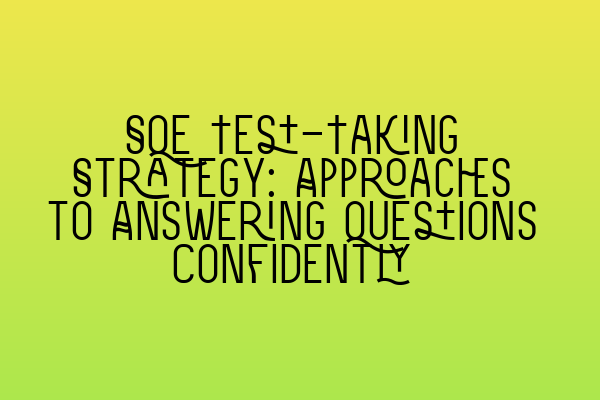SQE Test-Taking Strategy: Approaches to Answering Questions Confidently
Preparing for the Solicitors Qualifying Examination (SQE) can be a daunting task. With its comprehensive scope and rigorous testing, it’s essential to develop effective strategies for answering questions confidently. In this blog post, we’ll explore some approaches that can help you master the exam and succeed in your legal career.
1. Understand the Question
The first step in answering SQE questions confidently is to thoroughly understand what the question is asking. Take the time to read the question carefully, identifying key terms and concepts. Highlighting or underlining important information can provide you with a clear focus when formulating your answer.
By understanding the question, you can ensure that your response directly addresses the specific issues raised. This enables you to demonstrate your knowledge and analytical skills effectively, which is crucial for obtaining a high score.
2. Plan your Answer
Before diving into writing your response, it’s essential to plan your answer. This step helps you organize your thoughts and structure your response logically. Consider creating an outline or mind map that outlines the main points you want to address.
By planning your answer, you can ensure that you cover all the necessary points and present them coherently. This approach not only helps you stay focused but also enables the examiner to follow your arguments easily, increasing your chances of scoring well.
3. Use IRAC Method
The Issue, Rule, Application, and Conclusion (IRAC) method is a widely used technique in legal analysis. Applying this method can help you answer SQE questions confidently and concisely.
First, identify the issue raised in the question. Then, state the relevant legal rules or principles that apply to the issue. Next, apply these rules to the facts of the question, discussing how they affect the situation. Finally, provide a clear and logical conclusion based on your analysis.
By following the IRAC method, you ensure that you address all the necessary components of the question, allowing you to demonstrate your understanding and reasoning skills effectively.
4. Manage Your Time Wisely
Time management is crucial in any exam, and the SQE is no exception. With a limited amount of time available, it’s essential to allocate it wisely to each question.
Start by estimating the time required for each question based on its complexity and point value. This estimation helps you prioritize your efforts, ensuring that you spend an appropriate amount of time on each question. It’s generally advisable to leave some extra time for reviewing and editing your answers before submitting them.
By managing your time effectively, you can confidently complete all the questions within the allocated time and avoid rushing through them.
5. Practice with Mock Exams
One of the best ways to build confidence in answering SQE questions is through practice. Mock exams provide an opportunity to simulate the exam environment and familiarize yourself with the format and types of questions you’ll encounter.
Utilize resources such as Free Mocks SQE Training to access a wide range of practice questions and exams. This allows you to identify your strengths and weaknesses, enabling you to focus your efforts on areas that need improvement. The more you practice, the more comfortable and confident you’ll become in your abilities.
6. Seek Guidance and Support
Preparing for the SQE can be challenging, but you don’t have to do it alone. Seek guidance and support from experienced solicitors, tutors, and fellow candidates. Their insights and advice can provide invaluable tips and strategies for tackling SQE questions confidently.
Additionally, consider attending workshops or training sessions focused on relevant topics, such as tenant rights in the UK, land law intricacies, legal considerations in residential leases, or lease laws. These resources can deepen your understanding and improve your knowledge base, further enhancing your test-taking abilities.
Remember, answering SQE questions confidently requires a combination of knowledge, analytical skills, and effective test-taking strategies. By understanding the question, planning your answer, utilizing the IRAC method, managing your time wisely, practicing with mock exams, and seeking guidance and support, you can approach the SQE with confidence and increase your chances of success.
For more insights on specific legal topics, check these related articles:
- Tenant Rights in the UK: Understanding Your Legal Protections
- Examining the Intricacies of Land Law in the UK
- Legal Considerations in Residential Leases: Essential Insights for Solicitors
- Workshops on Land Law: Interactive Learning for Aspiring Property Law Professionals
- Lease Laws in the UK: Unraveling the Legal Framework for Tenants

Leave a Reply